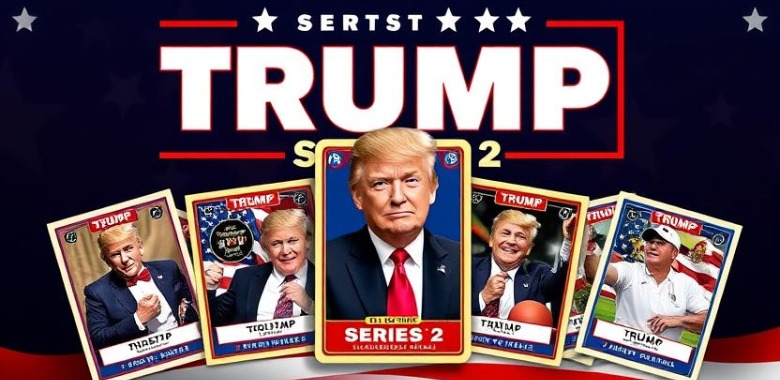
Donald Trump entered the NFT world with flair, controversy, and surprisingly strong sales. His digital trading card collections have captured attention far beyond typical NFT audiences, merging politics, pop culture, and blockchain tech into one very unconventional project.
The U.S. president's NFTs have become a standout case study in how celebrity status can drive NFT sales—even without traditional artistic or Web3 credentials. Here's a closer look at Trump's NFT ventures, what's in the collection, how they've performed, and what it means for the future of political NFTs.
How Trump's Digital Trading Cards Took Off
Trump's first NFT drop debuted in December 2022. The project featured 45,000 digital trading cards, priced at $99 each. The NFTs portrayed Trump in a variety of costumes and themes—astronaut, cowboy, superhero, and more—designed to reflect strength, patriotism, and tongue-in-cheek self-glorification.
Despite widespread criticism and parody, the collection sold out in less than 24 hours, generating over $4.5 million in primary sales.
Utility and Rewards
Buyers weren't just purchasing a JPEG—they were entering sweepstakes for experiences such as dinners with Trump, Zoom calls, signed memorabilia, or a cocktail hour at Mar-a-Lago. These perks added a utility layer, creating real-world value for supporters and collectors. What are the blockchain details:
- Minted on Polygon (Ethereum Layer 2) for lower fees
- Limited supply: 45,000 NFTs in Series 1
- Fixed price: $99 per card
- Hosted on CollectTrumpCards.com
Public Reaction and Media Buzz
The launch sparked intense debate. Critics viewed it as a cash grab and internet spectacle. Supporters praised Trump's marketing prowess and willingness to embrace Web3. Memes exploded across Twitter and Reddit, fueling even more visibility.
From The Daily Show to Bloomberg, media coverage ranged from humorous to analytical. The controversy only increased the collection's popularity.
Sales Performance
Within days of launch, secondary sales surged on OpenSea. Some cards flipped for over 10x the mint price. The hype eventually cooled, but not before the project had generated millions more in resale volume. Royalties from secondary trades flowed to the creators, believed to be a licensing group separate from Trump's campaign team.
Celebrity Influence in NFTs
Trump's success highlighted the power of celebrity branding in the NFT space. Unlike many influencer projects that faded quickly, the Trump NFTs maintained media relevance thanks to consistent PR and follow-up releases.

Continuing the NFT Buzz - Trump's Series 2 Launch
Following the success of Series 1, Trump launched a second series in April 2023. Series 2 introduced another batch of themed digital cards, including Trump as a rockstar, NASCAR driver, and golf pro.
- Another 47,000 NFTs
- Same mint price: $99
- Expanded sweepstakes and exclusive events
However, Series 2 didn't sell out as quickly as the original and drew more critical scrutiny, with some accusing the project of over-saturation.
Integration With Physical Collectibles
In late 2023, the team introduced a hybrid NFT-physical product line—allowing buyers to claim Trump-branded trading cards and signed items via NFT ownership. This move attracted traditional collectors and added a tangible element to the digital assets.
Trump NFTs and 2024 Election Speculation
While not officially part of his 2024 campaign, some observers believe the NFTs are a backdoor method for fundraising and rallying Trump's base. The digital cards keep him in the headlines and help reinforce his image as a disruptive figure who embraces new platforms.
Legal and Ethical Questions
The blurred line between political branding and personal monetisation has raised eyebrows. Because the project is licensed, not campaign-operated, it avoids FEC restrictions—but it also creates transparency concerns.
Market Impact and Long-Term Value
Trump NFTs saw rapid price spikes after each announcement, followed by cooldown periods. As of early 2025, some rare cards from Series 1 remain listed for thousands, while common ones trade below the original mint price.
Collectible or Speculative
Collectors view them as novelty items with historical and pop culture relevance. Others see them as speculative assets tied to Trump's future media moves or political influence.
Legacy in NFT History
Love them or hate them, Trump NFTs made waves. They've become emblematic of how NFTs can be used for branding, storytelling, and engaging niche communities—even outside typical crypto circles.
Conclusion
Donald Trump's NFT releases are every bit as provocative and attention-seeking as the man himself. By blending confrontational imagery, payoff-rich gamification, and unavoidable media coverage, the releases burst into the mainstream in ways fewer NFT efforts have.
Whether considered as virtual souvenirs, savvy marketing, or political showmanship, Trump's NFT campaign proved that attention—negative or positive—still equates to clicks and crypto.